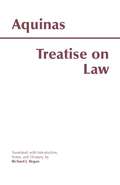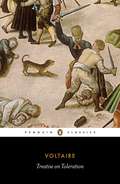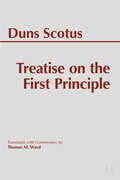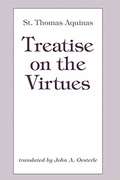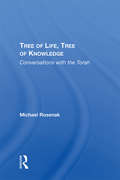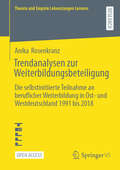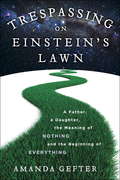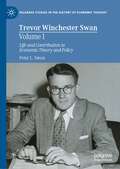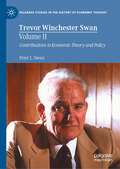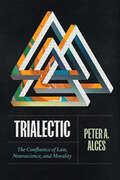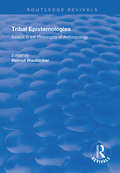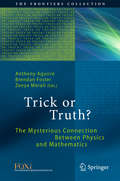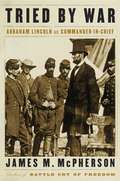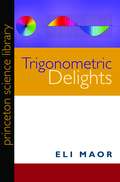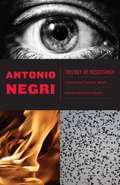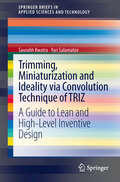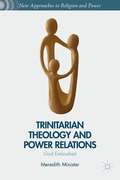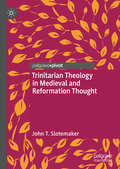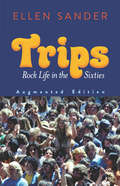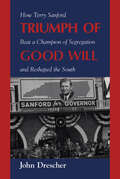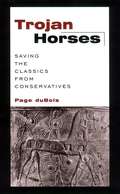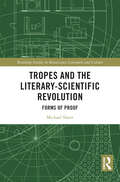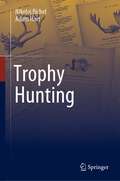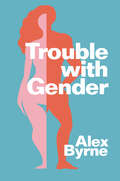- Table View
- List View
Treatise on Law
by Thomas Aquinas Richard J. Regan S. J.This new translation of the Treatise on Law offers fidelity to the Latin in a readable new version that will prove useful to students of the natural law tradition in ethics, political theory, and jurisprudence, as well as to students of Western intellectual history.
Treatise on Toleration
by VoltaireVoltaire's Treatise on Toleration is one of the most important essays on religious tolerance and freedom of thought A powerful, impassioned case for the values of freedom of conscience and religious tolerance, Treatise on Toleration was written after the Toulouse merchant Jean Calas was falsely accused of murdering his son and executed on the wheel in 1762. As it became clear that Calas had been persecuted by 'an irrational mob' for being a Protestant, the Enlightenment philosopher Voltaire began a campaign to vindicate him and his family. The resulting work, a screed against fanaticism and a plea for understanding, is as fresh and urgent today as when it was written.
Treatise on the First Principle (Hackett Classics)
by John Duns ScotusSeeking what he describes as "the utmost limit of the knowledge our natural reason can achieve . . . concerning the True Existence [that is God]," John Duns Scotus (1265–1308) offers in this treatise one of philosophy&’s most rigorous and ambitious attempts to deduce God&’s existence from purely metaphysical theorems. As elucidated by its concise philosophical commentary, Thomas M. Ward's new translation of the Treatise on the First Principle puts a masterpiece of natural theology within reach of a new generation of English-reading students of philosophy.
Treatise on the Virtues
by Thomas Aquinas John A. OesterleIn his Treatise on the Virtues, Aquinas discusses the character and function of habit; the essence, subject, cause, and meaning of virtue; and the separate intellectual, moral, cardinal, and theological virtues. His work constitutes one of the most thorough and incisive accounts of virtue in the history of Christian philosophy. John Oesterle's accurate and elegant translation makes this enduring work readily accessible to the modern reader.
Tree Of Life, Tree Of Knowledge: Conversations With The Torah
by Michael RosenakFrom the Preface: THE IDEA OF THIS BOOK came to my mind many years ago, after several conversations with my friend and colleague in Jewish educational studies Joseph Lukins professor at the Jewish Theological Seminary in New York. He had suggested that an educated Jew is, among other things, one who lives in some spiritual and cognitive proximity to the weekly Torah reading, the parashat hashavua, "portion of the week." He insisted that issues in the philosophy of education might be in the liturgy's scriptural readings,that even the way messages of tradition divided the Torah into "portions" reflected discrete modes of teaching Torah.In this book, theoretical conceptions, garnered from many places, even if they do not precede reading of Torah, are certainly prisms through which I can read it.
Trendanalysen zur Weiterbildungsbeteiligung: Die selbstinitiierte Teilnahme an beruflicher Weiterbildung in Ost- und Westdeutschland 1991 bis 2018 (Theorie und Empirie Lebenslangen Lernens)
by Anika RosenkranzIn diesem Open-Access-Buch wird untersucht, welche Muster bzw. Veränderungen der selbstinitiierten Teilnahme an beruflicher Weiterbildung sich im Trend identifizieren lassen. Bisherige Analysen, die die Teilnahme Beschäftigter an beruflicher Weiterbildung differenziert nach Ost- und Westdeutschland im Trend betrachtet haben, verweisen auf regionalspezifische Muster. Diese Unterschiede werden punktuell vor dem Hintergrund ost-west-spezifischer Arbeitsmarktkontexte verortet, oft jedoch findet keine Kontextualisierung statt. Inwieweit ost-west-spezifische Entwicklungen der Berufs- und Arbeitsmarktstrukturen Einfluss auf motivationale Aspekte der Teilnahmeentscheidung Beschäftigter nehmen, stand bisher nicht im Fokus. Die vorliegende Arbeit untersucht daher die Teilnahmeselektivität Beschäftigter an selbstinitiierter beruflicher Weiterbildung vor dem Hintergrund ost-west-spezifischer Entwicklungen der Berufs- und Arbeitsmarktstrukturen. Angesichts sich verändernder Kontexte lassen sich veränderte Muster der Teilnahme im Zeitverlauf beobachten. Die Befunde verweisen zudem auf regionale Strukturdifferenzen, die Einfluss auf die selbstinitiierte Teilnahme an beruflicher Weiterbildung nehmen. Insgesamt zeigt sich eine für ostdeutsche Beschäftigte verringerte Teilnahmequote im Vergleich zu westdeutschen Beschäftigten.
Trespassing on Einstein's Lawn
by Amanda GefterIn a memoir of family bonding and cutting-edge physics for readers of Brian Greene's The Hidden Reality and Jim Holt's Why Does the World Exist?, Amanda Gefter tells the story of how she conned her way into a career as a science journalist--and wound up hanging out, talking shop, and butting heads with the world's most brilliant minds. At a Chinese restaurant outside of Philadelphia, a father asks his fifteen-year-old daughter a deceptively simple question: "How would you define nothing?" With that, the girl who once tried to fail geometry as a conscientious objector starts reading up on general relativity and quantum mechanics, as she and her dad embark on a life-altering quest for the answers to the universe's greatest mysteries. Before Amanda Gefter became an accomplished science writer, she was a twenty-one-year-old magazine assistant willing to sneak her and her father, Warren, into a conference devoted to their physics hero, John Wheeler. Posing as journalists, Amanda and Warren met Wheeler, who offered them cryptic clues to the nature of reality: The universe is a self-excited circuit, he said. And, The boundary of a boundary is zero. Baffled, Amanda and Warren vowed to decode the phrases--and with them, the enigmas of existence. When we solve all that, they agreed, we'll write a book. Trespassing on Einstein's Lawn is that book, a memoir of the impassioned hunt that takes Amanda and her father from New York to London to Los Alamos. Along the way, they bump up against quirky science and even quirkier personalities, including Leonard Susskind, the former Bronx plumber who invented string theory; Ed Witten, the soft-spoken genius who coined the enigmatic M-theory; even Stephen Hawking. What they discover is extraordinary: the beginnings of a monumental paradigm shift in cosmology, from a single universe we all share to a splintered reality in which each observer has her own. Reality, the Gefters learn, is radically observer-dependent, far beyond anything of which Einstein or the founders of quantum mechanics ever dreamed--with shattering consequences for our understanding of the universe's origin. And somehow it all ties back to that conversation, to that Chinese restaurant, and to the true meaning of nothing. Throughout their journey, Amanda struggles to make sense of her own life--as her journalism career transforms from illusion to reality, as she searches for her voice as a writer, as she steps from a universe shared with her father to at last carve out one of her own. It's a paradigm shift you might call growing up. By turns hilarious, moving, irreverent, and profound, Trespassing on Einstein's Lawn weaves together story and science in remarkable ways. By the end, you will never look at the universe the same way again.Advance praise for Trespassing on Einstein's Lawn "This is the most charming book ever written about the fundamental nature of reality. Amanda Gefter sounds like your best friend telling you a captivating story, but really she's teaching you about some of the deepest ideas in modern physics and cosmology. Trespassing on Einstein's Lawn is a delight from start to finish."--Sean Carroll, theoretical physicist and author of The Particle at the End of the UniverseFrom the Hardcover edition.
Trevor Winchester Swan, Volume I: Life and Contribution to Economic Theory and Policy (Palgrave Studies in the History of Economic Thought)
by Peter L. SwanThis book, the first of two volumes, explores the legacy of Trevor Winchester Swan, often described as Australia’s greatest ever economist. An insightful biography is accompanied with Swan’s most prominent articles to provide a broad view of his life and work. Particular attention is given to the famous Swan Diagram, known among macroeconomists worldwide, Swan’s four zones of economic unhappiness, his view of how economies grew based on capital deepening and technical progress, and the Solow-Swan model of economic growth. This book aims to shed light on the enigmatic and influential life of Trevor Winchester Swan. It will be relevant to students and researchers interested in the history of economic thought.
Trevor Winchester Swan, Volume II: Contributions to Economic Theory and Policy (Palgrave Studies in the History of Economic Thought)
by Peter L. SwanThis book, the second of two volumes, explores the legacy of Trevor Winchester Swan, often described as Australia’s greatest ever economist. Some of Swan’s most prominent articles are presented alongside analysis of his work from leading historians of economic thought to provide a broad and insightful view of his work. Particular attention is given to Swan’s work on the balance of payments, economic development, capital accumulation, and the neoclassical growth model. This book aims to shed light on the enigmatic and influential life of Trevor Winchester Swan. It will be relevant to students and researchers interested in the history of economic thought and those that want to understand the foundations of modern macro, trade, and neoclassical economics.
Trialectic: The Confluence of Law, Neuroscience, and Morality
by Peter A. AlcesA thought-provoking examination of how insights from neuroscience challenge deeply held assumptions about morality and law. As emerging neuroscientific insights change our understanding of what it means to be human, the law must grapple with monumental questions, both metaphysical and practical. Recent advances pose significant philosophical challenges: how do neuroscientific revelations redefine our conception of morality, and how should the law adjust accordingly? Trialectic takes account of those advances, arguing that they will challenge normative theory most profoundly. If all sentient beings are the coincidence of mechanical forces, as science suggests, then it follows that the time has come to reevaluate laws grounded in theories dependent on the immaterial that distinguish the mental and emotional from the physical. Legal expert Peter A. Alces contends that such theories are misguided—so misguided that they undermine law and, ultimately, human thriving. Building on the foundation outlined in his previous work, The Moral Conflict of Law and Neuroscience, Alces further investigates the implications for legal doctrine and practice.
Tribal Epistemologies: Essays in the Philosophy of Anthropology (Routledge Revivals)
by Helmut WautischerFirst published in 1998, this collection of ten essays transforms our understanding of both the role of philosophical anthropology in modern world philosophy and the origins of tribal knowledge in their relation to contemporary assessments of cognition and consciousness. Ethnographic data from geographically distant cultures - such as the Maori of New Zealand, the Fore of New Guinea, the Sea Nomads of the Andaman, the Cowlitz of North America, the Maya, Australian Aborigines, Siberian Shamans - are carefully crafted toward an empirical basis for discussing a variety of phenomena traditional labelled in Western thought as transcendent or metaphysical. This anthology is a valuable source of information relevant for any theories of knowledge and a solid challenge for reductionist models of consciousness. The essays enhance our recognition and appreciation of fundamental similarities as well as differences in world views and cultural perspectives related to knowledge claims. This anthology illustrates unplumbed depths of human consciousness, reveals experiential understandings beyond linguistic thought, and stands aside from the view that behaviour and intelligence can be understood by deterministic principles. This volume of essays should be read with stereoscopic vision: one lens focusing on the rich ethnographic material of folk societies, the other focusing on the wider awareness of how we come to know what we know. It features specialists in philosophy, ethnology and comparative sociology, comparative religion, cross-cultural psychology, physical anthropology, environmental and marine scientists, Indian affairs, anthropology, comparative literature, shamanism and theoretical biology. These contributors explore issues including individuality in relational cultures, Maori epistemology, shamanistic knowledge and cosmology and images of conduct, character and personhood in the Native American tradition.
Trick or Truth?
by Anthony Aguirre Brendan Foster Zeeya MeraliThe prize-winning essays in thisbook address the fascinating but sometimes uncomfortable relationship betweenphysics and mathematics. Ismathematics merely another natural science? Or is it the result of humancreativity? Does physics simply wear mathematics like a costume, or is math thelifeblood of physical reality? The nineteen wide-ranging, highly imaginative and oftenentertaining essays are enhanced versions of the prize-winning entries to theFQXi essay competition "Trick or Truth", which attracted over 200 submissions. The Foundational QuestionsInstitute, FQXi, catalyzes, supports, and disseminates research on questions atthe foundations of physics and cosmology, particularly new frontiers andinnovative ideas integral to a deep understanding of reality, but unlikely tobe supported by conventional funding sources.
Tried by War: Abraham Lincoln as Commander in Chief
by James M. McphersonJames McPherson, a bestselling historian of the Civil War, illuminates how Lincoln worked with - and often against - his senior commanders to defeat the Confederacy and create the role of commander in chief as we know it. Though Abraham Lincoln arrived at the White House with no previous military experience (apart from a couple of months spent soldiering in 1832), he quickly established himself as the greatest commander in chief in American history. James McPherson illuminates this often misunderstood and profoundly influential aspect of Lincoln's legacy. In essence, Lincoln invented the idea of commander in chief, as neither the Constitution nor existing legislation specified how the president ought to declare war or dictate strategy. In fact, by assuming the powers we associate with the role of commander in chief, Lincoln often overstepped the narrow band of rights granted the president. Good thing too, because his strategic insight and will to fight changed the course of the war and saved the Union. For most of the conflict, he constantly had to goad his reluctant generals toward battle, and he oversaw strategy and planning for major engagements with the enemy. Lincoln was a self-taught military strategist (as he was a self-taught lawyer), which makes his adroit conduct of the war seem almost miraculous. To be sure, the Union's campaigns often went awry, sometimes horribly so, but McPherson makes clear how the missteps arose from the all-too-common moments when Lincoln could neither threaten nor cajole his commanders to follow his orders. Because Lincoln's war took place within our borders, the relationship between the front lines and the home front was especially close - and volatile. Here again, Lincoln faced enormous challenges in exemplary fashion. He was a masterly molder of public opinion, for instance, defining the war aims initially as preserving the Union and only later as ending slavery - when he sensed the public was at last ready to bear such a lofty burden. As we approach the bicentennial of Lincoln's birth in 2009, this book will be that rarest gift-a genuinely novel, even timely, view of the most-written-about figure in our history. Tried by War offers a revelatory portrait of leadership during the greatest crisis our nation has ever endured. How Lincoln overcame feckless generals, fickle public opinion, and his own paralyzing fears is a story at once suspenseful and inspiring.
Trigonometric Delights
by Eli MaorTrigonometry has always been the black sheep of mathematics. It has a reputation as a dry and difficult subject, a glorified form of geometry complicated by tedious computation. In this book, Eli Maor draws on his remarkable talents as a guide to the world of numbers to dispel that view. Rejecting the usual arid descriptions of sine, cosine, and their trigonometric relatives, he brings the subject to life in a compelling blend of history, biography, and mathematics. He presents both a survey of the main elements of trigonometry and a unique account of its vital contribution to science and social development. Woven together in a tapestry of entertaining stories, scientific curiosities, and educational insights, the book more than lives up to the title Trigonometric Delights.Maor, whose previous books have demystified the concept of infinity and the unusual number "e," begins by examining the "proto-trigonometry" of the Egyptian pyramid builders. He shows how Greek astronomers developed the first true trigonometry. He traces the slow emergence of modern, analytical trigonometry, recounting its colorful origins in Renaissance Europe's quest for more accurate artillery, more precise clocks, and more pleasing musical instruments. Along the way, we see trigonometry at work in, for example, the struggle of the famous mapmaker Gerardus Mercator to represent the curved earth on a flat sheet of paper; we see how M. C. Escher used geometric progressions in his art; and we learn how the toy Spirograph uses epicycles and hypocycles.Maor also sketches the lives of some of the intriguing figures who have shaped four thousand years of trigonometric history. We meet, for instance, the Renaissance scholar Regiomontanus, who is rumored to have been poisoned for insulting a colleague, and Maria Agnesi, an eighteenth-century Italian genius who gave up mathematics to work with the poor--but not before she investigated a special curve that, due to mistranslation, bears the unfortunate name "the witch of Agnesi." The book is richly illustrated, including rare prints from the author's own collection. Trigonometric Delights will change forever our view of a once dreaded subject.
Trilogy of Resistance
by Antonio NegriWith Trilogy of Resistance, the political philosopher Antonio Negri extends his intervention in contemporary politics and culture into a new medium: drama. The three plays collected for the first time in this volume dramatize the central concepts of the innovative and influential thought he has articulated in his best-selling books Empire and Multitude, coauthored with Michael Hardt. In the tradition of Bertolt Brecht and Heiner Müller, Negri&’s political dramas are designed to provoke debate around the fundamental questions they raise about resistance, violence, and tyranny. In Swarm, the protagonist searches for an effective mode of activism; with the help of a Greek-style chorus, she tries on different roles, from the suicide bomber and party apparatchik to the multitude. The Bent Man, set in fascist Italy, focuses on a woodcutter who resists fascism by bending himself in two and using his own now-twisted body as a weapon against war. In Cithaeron, perhaps the most audacious of the three plays, Negri reworks Euripides&’s Bacchae to explore the circumstances that would compel a diverse and creative community to withdraw from both the despotic government that constrains it and the traditional family relationships that reinforce that despotism.First published in France in 2009 and featuring an introduction by Negri, Trilogy of Resistance provides a direct and passionate distillation of Negri&’s concepts and offers insights into one of the most important projects in political philosophy currently under way, as well as a timely reminder of the power of theater to effectively dramatize complex and challenging ideas.
Trimming, Miniaturization and Ideality via Convolution Technique of TRIZ
by Saurabh Kwatra Yuri SalamatovThe book is a valuable research tool-kit for innovators, amateur & professionals alike. Additionally, College & University faculties on Engineering, who organize yearly workshops internationally will find hundreds of novel themes to choose from. Some teachers might just secretly buy this book to introduce out-of-box brain-teasers in classroom to add fizz to normal (at times boring) lecturing. The book can be used as main/add-on textbook towards following courses: (1) Master's degree programs on design innovation worldwide and (2) Senior undergraduate courses in industrial, engineering & product design.
Trinitarian Theology and Power Relations
by Meredith MinisterThis text crafts a trinitarian theology that reorients theology from presumptions about the immateriality of the Trinity toward the places where the Trinity matters--material bodies in historical contexts and the intersecting ways political and theological power structures normalize and marginalize bodies on the basis of material difference.
Trinitarian Theology in Medieval and Reformation Thought
by John T. SlotemakerThis book is an introduction to trinitarian theology as it developed from the late medieval period. John T. Slotemaker presents an overview of the central aspects of trinitarian theology by focusing on four themes: theological epistemology, the emanations in God, the divine relations, and the Trinity of persons. He does so by exploring a broad range of theological opinions on each subject and delineating the options that existed for medieval theologians from the early thirteenth century through the sixteenth. He argues that despite the diversity of opinion on a given subject, there is a normative theological center that grounds late medieval trinitarian theology. This center consists of theological developments involving the adoption of Peter Lombard’s Sentences as a theological textbook, the conciliar decisions of Lateran IV, and a shared Aristotelian philosophical background of Western trinitarian theology.
Trips: Rock Life in the Sixties—Augmented Edition
by Ellen Sander"Simply one of the best pieces of rock reportage ever written." — Los Angeles Review of BooksAs a pioneering rock journalist for Hit Parader, Vogue, Saturday Review, and other publications, Ellen Sander had a backstage pass to the hottest music scenes of the 1960s. In this feast of juicy anecdotes and keen social commentary, she draws upon her professional and personal experiences to chronicle pop culture's highs and lows during the turbulent decade. Join her for weird and wild road trips with companions ranging from Yippies to the members of Led Zeppelin. Stops along the way include the folk music clubs of Greenwich Village, Haight-Ashbury in its riotous heyday, and the euphoric festivals at Monterey and Woodstock."It is a memoir, a sourcebook, and a love letter," Sander writes, "a recollection of a time, parenthesized by ambivalence and apathy, a search for the ultimate high, a generation with an irrepressible vision, its art, artists, its audience, and the substance of its statement." This expanded edition of Trips adds "The Plaster Casters of Chicago," Sander's seminal piece on groupie culture, the lengthy "Concerts and Conversations," as well as a new Preface and chapter postscripts.
Triumph of Good Will: How Terry Sanford Beat a Champion of Segregation and Reshaped the South
by John DrescherIn the spring of 1960 two talented, capable men, each with great passion and conviction, opposed each other in a pivotal governor's race that was to shake North Carolina and change southern politics forever. Both Terry Sanford and I. Beverly Lake were Democrats in the one-party South of that era. Yet they were different in almost every other way. Lake, a middle-aged law professor, was committed to segregation. Sanford, an ambitious young politician and lawyer, believed in expanding opportunities for all citizens. In their run-off Lake wanted the contest to be a referendum on preserving segregation. Sanford's platform rested on the improvement of public schools. It was a heated struggle that would bind them together for the rest of their lives. With unparalleled access to both sides and an objective correspondent's hindsight view, John Drescher has written the biography of a campaign that set the winning strategy for many who followed, and of a winning candidate, a governor rated as one of the finest of the twentieth century. Sanford, the moderate, won, and his victory is an oddity, for in the civil rights period from 1957 to 1973 only twice in the South did racial moderates defeat strong segregationists in a governor's race. In a gamble that almost cost Sanford the election, he became the first major politician in the Bible Belt to endorse the Catholic John F. Kennedy for president. In the November vote he defeated his Republican opponent in what was then the closest North Carolina governor's race of the century. His win validated his belief in the triumph of good will among North Carolina's people. Sanford became a bold, aggressive governor of unusual energy and creativity. His school program added teachers and dramatically raised teacher pay. He helped establish a statewide system of community colleges and started an anti-poverty fund later emulated by LBJ as a model for the War on Poverty. He was the first southern governor to call for employment without regard to race or creed. Sanford became the model for other southern governors who stressed education and a moderate stand on race relations. He influenced other gubernatorial candidates across Dixie -- Jim Hunt in his own state, William Winter in Mississippi, Dick Riley in South Carolina, Bill Clinton in Arkansas. The effects of that 1960 race continue to be felt in North Carolina, in the South, and across the nation.
Triviale Einsichten, die niemand befolgt: Wissenschaftliche und philosophische Erkenntnisse zu alltäglichen Fragen
by Jürgen BeetzWarum ist ein „Wirtschaftsweiser“ für Mindestlöhne und ein anderer dagegen? Wieso verfangen wir uns in ergebnislosen Diskussionen oder albernen Paradoxien, fallen auf die „Spielchen“ unserer Mitmenschen herein, verkennen Ursache und Wirkung, verwechseln Zufall und Vorbestimmung? Weshalb denken wir so und handeln anders? Sagen wir, was wir meinen oder meinen wir viel mehr oder etwas ganz anderes, als wir sagen? Wieso entstehen neue Systeme mit meist unerwarteten Eigenschaften „von selbst“? Wie entsteht eine neue Qualität durch eine veränderte Quantität? Dieses Buch zeigt, dass Philosophie, die „Liebe zur Weisheit“, auch im Alltag viele Probleme lösen und Handlungsanweisungen liefern kann. Dabei sind es oft „triviale Einsichten“, die uns einen Schritt voran bringen: Erkenntnisse, die wir schon längst haben oder durch ein wenig Nachdenken erlangen könnten, die wir aber einfach nicht beherzigen – aus vielfältigen Gründen, die hier ausführlich untersucht werden, mit dem Ziel, sie zu überwinden. Hier gehen Hirnforschung, Naturwissenschaften, Psychologie und Philosophie nebst einer Prise (Selbst-)Ironie eine interessante und amüsante Verbindung ein. Uns begegnen auf dieser Exkursion Paradoxien, die menschliche Evolution, zyklische Prozesse und seltsame Schleifen, Wahrnehmungstäuschungen, vernetzte Systeme und Regelkreise – schließlich das Chaos und die „objektive“ Wahrheit. Die Leser lernen, Querverbindungen und Zusammenhänge zu erkennen, die sie bisher nicht gesehen haben. Einfache Erkenntnisse werden erneut ins Gedächtnis gerufen. Wir entdecken offensichtliche Vorteile beim Gebrauch des Verstandes und vermeiden die kleinen aber tückischen Fallen des Alltags: fruchtlose Schwarz-/Weiß-Diskussionen, verborgene Zwickmühlen innerer Widersprüche, kostspieligen Aberglauben oder schädliche Psycho-Spiele. Also lautet die Devise: „Benutze deinen Verstand!“
Trojan Horses: Saving the Classics from Conservatives
by Page DuBoisA passionate reexamination of the ancient world and the lessons we can draw from antiquityIn today’s turbulent cultural moment, it is all too common for conservatives to invoke the wisdom of the ancient Greeks in the name of timeless virtues. At the same time, critics have charged that multiculturalists have hopelessly corrupted the study of antiquity itself, and that the teaching of Classics is dead.Trojan Horses is Page duBois's answer to scholars and theorists—such as Camille Paglia, Allan Bloom, and William Bennett—who have appropriated antiquity in the service of a conservative political agenda. She challenges cultural conservatives' appeal to the authority of the Classics by revealing their presentation of ancient Greece as simplistic, ahistorical, and irreparably distorted by their politics. In its devastating critique of these pundits, Trojan Horses presents a more complex and more accurate view of ancient Greek politics, sex, and religion. In her incisive examinations of figures such as Daedalus and Artemis, duBois eloquently conveys their complexity and passion, but also unearths actions and beliefs that do not square so easily with today's conservative values. As duBois writes, "Like Bennett, I think we should study the past, but not to find nuggets of eternal wisdom. Rather we can comprehend in our history a fuller range of human possibilities, of beginnings, of error, and of difference."In these chapters, duBois offers readers a view of the ancient Greeks that is more nuanced, more subtle, more layered and in every way more historical than the portrait many of today’s scholars strive to display in our classrooms. Sharp, timely, and engaging, Trojan Horses portrays the richness of ancient Greek culture while riding in to rescue the Greeks from the new barbarians.
Tropes and the Literary-Scientific Revolution: Forms of Proof (Routledge Studies in Renaissance Literature and Culture)
by Michael SlaterTropes and the Literary-Scientific Revolution: Forms of Proof argues that the rise of mechanical science in the seventeenth century had a profound impact on both language and literature. To the extent that new ideas about things were accompanied by new attitudes toward words, what we commonly regard as the “scientific revolution” inevitably bore literary dimensions as well. Literary tropes and forms underwent tremendous reassessment in the seventeenth century, and early modern science was shaped just as powerfully by contest over the place of literary figures, from personification and metaphor to anamorphosis and allegory. In their rejection of teleological explanations of natural motion, for instance, early modern philosophers often disputed the value of personification, a figural projection of interiority onto what was becoming increasingly a mechanical world. And allegory—a dominant mode of literature from the late Middle Ages until well into the Renaissance—became “the vice of those times,” as Thomas Rymer described it in 1674. This book shows that its acute devaluation was possible only in conjunction with a distinctively modern physics. Analyzing writings by Sidney, Shakespeare, Bacon, Jonson, Brahe, Kepler, Galileo, Hobbes, Descartes, and more, it asserts that the scientific revolution was a literary phenomenon, just as the literary revolution was also a scientific one.
Trophy Hunting
by Adam Hart Nikolaj BichelThis book gets to the heart of trophy hunting, unpacking and explaining its multiple facets and controversies, and exploring why it divides environmentalists, the hunting community, and the public. Bichel and Hart provide the first interdisciplinary and comprehensive approach to the study of trophy hunting, investigating the history of trophy hunting, and delving into the background, identity and motivation of trophy hunters. They also explore the role of social media and anthropomorphism in shaping trophy hunting discourse, as well as the viability of trophy hunting as a wildlife management tool, the ideals of fair chase and sportsmanship, and what hunting trophies are, both literally and in terms of their symbolic value to hunters and non-hunters. The analyses and discussions are underpinned by a consideration of the complex moral and practical conflicts between animal rights and conservation paradigms. This book appeals to scholars in environmental philosophy, conservation and environmental studies, as well as hunters, hunting opponents, wildlife management practitioners, and policymakers, and anyone with a broad interest in human–wildlife relations.
Trouble With Gender: Sex Facts, Gender Fictions
by Alex ByrneSex used to rule. Now gender identity is on the throne. Sex survives as a cheap imitation of its former self: assigned at birth, on a spectrum, socially constructed, and definitely not binary. Apparently quite a few of us fall outside the categories ‘male’ and ‘female’. But gender identity is said to be universal – we all have one. Humanity used to be cleaved into two sexes, whereas now the crucial division depends on whether our gender identity aligns with our body. If it does, we are cisgender; if it does not, we are transgender. The dethroning of sex has meant the threat of execution for formerly noble words such as ‘woman’ and ‘man’. In this provocative, bold, and humane book, the philosopher Alex Byrne pushes back against the new gender revolution. Drawing on evidence from biology, psychology, anthropology and sexology, Byrne exposes the flaws in the revolutionary manifesto. The book applies the tools of philosophy, accessibly and with flair, to gender, sex, transsexuality, patriarchy, our many identities, and our true or authentic selves. The topics of Trouble with Gender are relevant to us all. This is a book for anyone who has wondered ‘Is sex binary?’, ‘Why are men and women different?’, ‘What is a woman?’ or, simply, ‘Where can I go to know more about these controversies?’ Revolutions devour their own children, and the gender revolution is no exception. Trouble with Gender joins the forefront of the counter-revolution, restoring sex to its rightful place, at the centre of what it means to be human.
